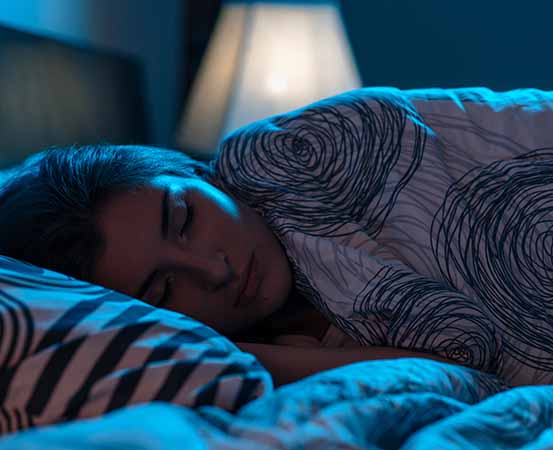
While creating a good sleeping environment is enough to ensure a good night’s rest for many, such measures fall short for some, who still find it difficult to achieve peaceful, uninterrupted sleep. At such times, using simple yet effective hacks such as yoga and meditation for a sound sleep can save the day.
Agnus Rozario, a 27-year-old product marketer at a private firm in Bangalore, used a meditation app that recites sleep stories with a hypnotic voice and music. “It helped me sleep better when I was dealing with sleep deprivation,” she says. According to experts, those having trouble sleeping need to alter their lifestyle by incorporating and discarding (or limiting) certain practices to achieve good-quality sleep.
Hacks for good sleep
Experts list some go-to sleep hacks that’ll help improve your sleep quality and restore your body:
1. Reduce light exposure and limit screen time
Light is one of the components that can affect your sleep-wake cycle. If you are sleeping in a brightly lit room, it can slow down the release of melatonin — a hormone that helps you fall asleep. Artificial light can reduce your melatonin levels, and continuous exposure to it from electronic devices can make you stay awake for longer, making it harder for you to fall asleep.
For better sleep, try using an indirect light when reading a book; if you are reading an e-book on your computer, try using blue-blocker sunglasses, suggests Dr Suhas HS, consultant pulmonologist, Manipal Hospital, Bangalore.
Using gadgets or doom scrolling (reading negative news or stories for prolonged periods) for a long time can disturb your sleep. Put away your electronic devices at least one to two hours prior to sleep. Dr Manjunath BG, pulmonologist, Manipal Hospital, Bangalore, says, “Turn off notifications on your phone to get a good night’s sleep.”
2. Block out the noise
Excessive noise can cause you to wake up feeling unrefreshed and fatigued. Over time, the noise can increase the cortisol levels in your body, which can lead to an elevated heart rate and high blood pressure.
Dr Suhas recommends closing the windows before going to sleep to block out the noise. If you are exposed to noise while sleeping, try wearing ear plugs. It’s also important to avoid sounds from gadgets.
3. Sleep trackers to the rescue
Sleep trackers can monitor your sleep patterns and provide information about the timing, duration and quality of your sleep. They can also help you detect sleep issues like sleep apnea. Experts emphasize that sleep-tracking devices should be used as a tool to check for any sleep issues. You can also consult an expert if needed.
4. Practice proper eating habits
Eating oily foods late at night can cause gastroesophageal reflux (GERD) — a condition where stomach acids or bile irritate the lining of the food pipe. Additionally, a meal high in calories, carbohydrates and fats can also cause weight gain apart from disrupting sleep. Dr Suhas says, “Lying down immediately after having a heavy meal can cause sleep disruption.” Hence, it is recommended to have meals at least two hours before going to sleep. Balancing your diet with proteins and vitamins is crucial. Avoid caffeine in the evening and replace it with herbal teas or moon milk. Supplements (like melatonin) should only be taken after consulting with the experts.
5. Exercise regularly
Besides helping you stay healthy, regular exercise also makes you fall asleep faster and improves your sleep quality. In addition, a lack of physical activity also increases your sleep latency — the amount of time required to transition from being fully awake to asleep — and reduces your total sleep duration. “The more sedentary you are, the longer your sleep latency,” shares Dr Suhas.
However, experts say that doing strenuous exercise closer to bedtime will make it harder for you to sleep. Dr Suhas explains, “When you do physical exercise before bedtime, there’s a chance that you will wake up feeling disoriented and tired. Therefore, you should be engaged in physical activities throughout the day instead of doing so before going to sleep.” Instead of a strenuous workout, you can do a brisk walk 45 minutes before going to bed.
6. Limit daytime naps
While experts suggest that taking a short nap during the day would help you sleep better at night, you should keep those naps to 15–30 minutes; anything longer than that can interrupt your night’s sleep. Taking a short nap of less than five minutes can make you more alert and improve your memory.
7. Keep the room temperature cool
Keeping the temperature of your bedroom on the cooler side can aid in getting good-quality sleep. Your body temperature starts to drop before going to sleep. Hence, lowering the thermostat at night can work hand in hand with this natural temperature fluctuation, signaling to the body that it’s time to sleep. Dr Suhas says that keeping the temperature between 60 and 70 degrees is best for a good night’s sleep.
8. Sleep the right way
Sleeping in the wrong position can lead to problems such as acid reflux and pain in the back and neck. According to experts, sleeping on your side (left or right) by bringing your knees towards the body helps relieve pressure on the spine and promotes better sleep. Additionally, using a good-quality mattress can also play a role in achieving peaceful and uninterrupted sleep.
9. Yoga and meditation
Stress or anxiety resulting from work or other reasons can disrupt your sleep. Experts therefore recommend relaxation techniques like yoga and meditation before bedtime to reduce stress.
Yoga Nidra, also known as non-sleep deep rest or NSDR, is a form of meditation that helps heal the body and mind. Involving long exhalations and body scans, this technique helps you achieve deep sleep or relaxation.
















